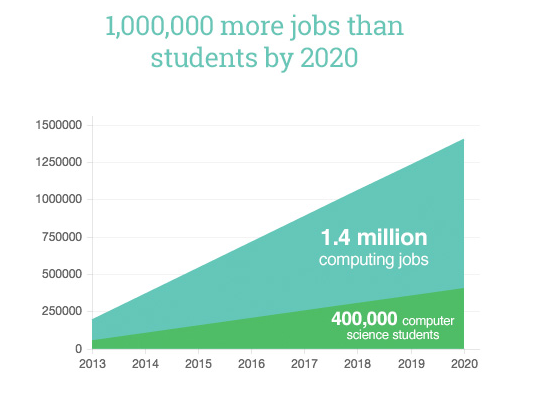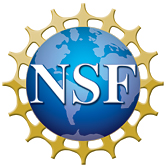The Stats. Over the next 10 years, the Bureau of Labor Statistics (BLS) predicts that the number of job openings in Computing and Mathematics will grow faster than in any other STEM discipline. Based on these projections, there will be over 1 million computing job openings that go unfilled by U.S. workers by 2022. This situation is particularly unfortunate, considering the lucrative nature of these positions, with computer science (CS) college graduates making $1.67 million in their lifetime (40% more than the average college graduate). Furthermore, reports routinely classify computing jobs as some of the most satisfying!

Why aren’t students pursuing computer science? Currently, only 2.4% of students who graduate from college have a degree in CS. 98% of current CS majors report having been exposed to CS before college, but only 1 out of 4 schools around the U.S. teach a CS class. This suggests that, without some exposure before college, many students either do not feel confident enough to pursue this prospering field or do not realize the opportunity even exists. By exposing more students to CS education in K-12 schools, we can put more students in the pipeline to filling these lucrative jobs, resulting in several billions of dollars in earnings by American workers within the next decade.

Who’s trying to solve this problem? Thanks to new initiatives like the Hour of Code and Computer Science Ed Week, the CS education problem is reaching the minds of parents around the country. President Obama’s 4 billion dollar pledge to support CS education in schools further highlights the nation’s need for more CS graduates. In addition to these various initiatives, the National Science Foundation (NSF) funds various research and development projects of small businesses around the country in order to promote the progress of science and advance national health, prosperity, and welfare. The NSF has a strong interest in promoting CS education for the advancement of national prosperity.
LearnToMod is trying to solve the CS education problem. This past year, the LearnToMod Team garnered support from the National Science Foundation (NSF) through a Small Business Innovation Research (SBIR) Phase I grant. Because LearnToMod engages K-12 students in coding well before college, LearnToMod has the potential to inspire students to pursue CS as a profession and gives students the building blocks necessary to feel capable in their pursuit of CS in college. We were able to develop a lot of new features on LearnToMod with the NSF’s support! Check out our Project Outcomes report for this project by going here. Ours is the first grant in this list!
Additional Resources about CS Education Statistics:
Code.org. (2016). Promote Computer Science. Retrieved January 13, 2016, from: https://code.org/promote
Computer Science Education Week (CSEdWeek). (2015). Blurbs and Useful Stats. Retrieved January 13, 2016, from: https://csedweek.org/resource_kit/blurbs
